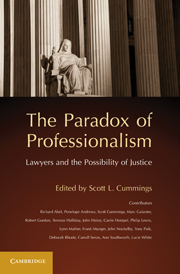Book contents
- Frontmatter
- Contents
- List of Tables and Figures
- Contributors
- Preface and Acknowledgments
- 1 Introduction
- PART I LAWYERS AND THE PUBLIC GOOD: THE FUNDAMENTAL DILEMMA
- 2 Are Lawyers Friends of Democracy?
- 3 “The Conscience of Society?”
- 4 More Lawyers than People
- 5 Faces of the Tort Pyramid
- PART II LAWYERS AND THEIR CLIENTS: DETERMINANTS OF ETHICAL PRACTICE
- PART III LAWYERS AND SOCIAL CHANGE: MOBILIZING LAW FOR JUSTICE
- 14 Epilogue
- Index
- References
3 - “The Conscience of Society?”
The Legal Complex, Religion, and the Fates of Political Liberalism
Published online by Cambridge University Press: 05 June 2012
- Frontmatter
- Contents
- List of Tables and Figures
- Contributors
- Preface and Acknowledgments
- 1 Introduction
- PART I LAWYERS AND THE PUBLIC GOOD: THE FUNDAMENTAL DILEMMA
- 2 Are Lawyers Friends of Democracy?
- 3 “The Conscience of Society?”
- 4 More Lawyers than People
- 5 Faces of the Tort Pyramid
- PART II LAWYERS AND THEIR CLIENTS: DETERMINANTS OF ETHICAL PRACTICE
- PART III LAWYERS AND SOCIAL CHANGE: MOBILIZING LAW FOR JUSTICE
- 14 Epilogue
- Index
- References
Summary
“An independent little Republic at the heart of the state.”
–Counselor to French Prime Minister (1731)“The Church is the conscience of society.
If we do wrong and you keep quiet,
you shall answer for our mistakes.”
–Jomo Kenyatta (1976)INTRODUCTION
In the autumn of 1731, the Parisian Order of Barristers went on strike. Provocations for such a dramatic protest against royal justice had been building for several years as the bar progressively articulated ideas that intimated limits on royal power. The Crown initially counseled restraint despite its considerable exasperation with the Order as “an independent little republic at the heart of the state.” But restraint disappeared when confronted with a legal brief that proclaimed the subversive doctrine that “all laws are contracts between those who govern and those who are governed.” The king's council threatened disbarment of the brief's author and thirty-nine fellow barristers unless they retracted the document. After negotiations failed to defuse the confrontation, lawyers walked out of the courts, thereby denying the Crown of a central function – the dispensing of justice. Confronted with an obdurate profession, the Crown held out for three months and then effectively conceded the battle to the lawyers.
The work stoppage symbolized a moment when the very foundations of royal absolutism began to be eroded, spurring the beginnings of a movement, said Voltaire, where “simple citizens triumphed, having no arms but reason.”
- Type
- Chapter
- Information
- The Paradox of ProfessionalismLawyers and the Possibility of Justice, pp. 50 - 67Publisher: Cambridge University PressPrint publication year: 2011
References
- 2
- Cited by

